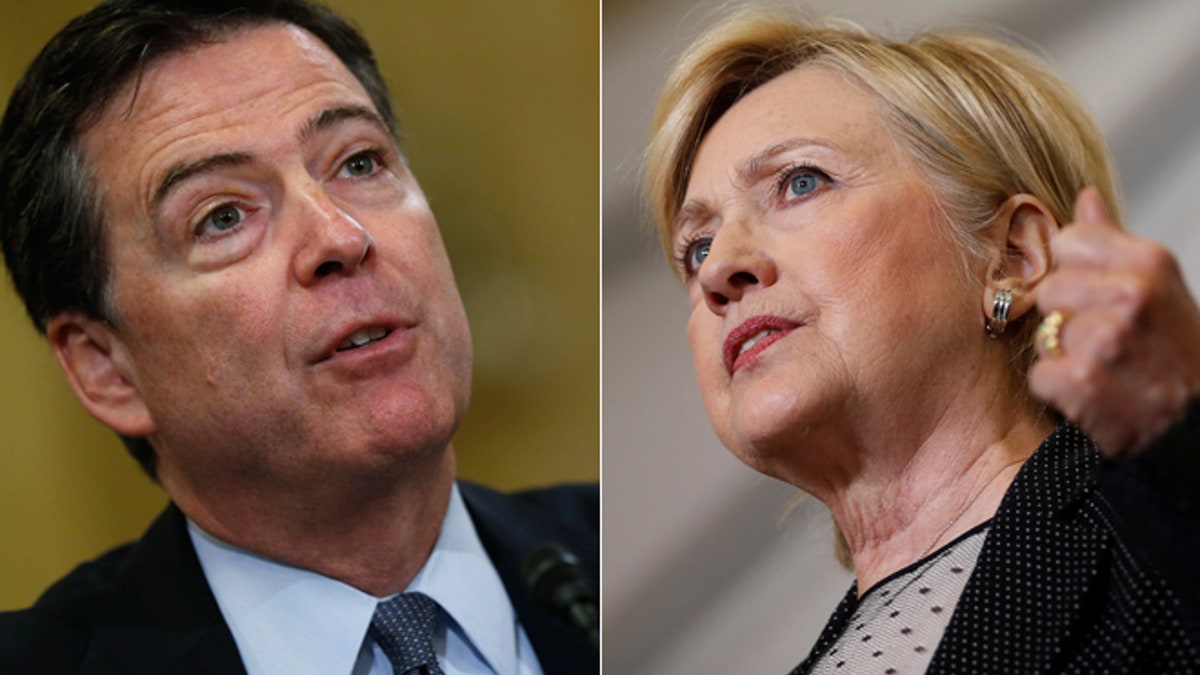
Top FBI agents who were part of just a small circle at the bureau’s headquarters investigating Hillary Clinton’s private email server were preparing to exonerate the Democratic presidential candidate long before they finished gathering critical evidence and witness accounts, a new report reveals.
The proof, according to a published report by The Hill Wednesday, provided damning evidence showing that Clinton’s handling of her emails was potentially criminal conduct.
The report suggested that congressional investigators had written evidence showing that the FBI believed that Clinton and her top aides broke some laws by transmitting classified information through her insecure private email server.
When asked for comment, an FBI source directed Fox News to former FBI Director James Comey’s July 5, 2016 statement, in which he seemed to acknowledge possible criminality but said it wasn’t enough to charge the then-presidential candidate.
“Although there is evidence of potential violation of the statutes regarding the handling of classified information, our judgment is that no reasonable prosecutor would bring such a case,” Comey said in the statement. “Prosecutors necessarily weigh a number of factors before bringing the charges. There are obvious considerations, like the strength of the evidence, especially regarding intent.”
The wording implied Comey’s decision not to recommend criminal prosecution was based on the former secretary of state’s “intent” and not on the violation of the “statutes” covering handling of classified information. That raised eyebrows in legal circles at the time, as the relevant criminal statute specifically does not require that prosecutors establish intent, merely recklessness in the handling of classified information.
“They concluded that she had no criminal intent, no intent to commit espionage,” retired Assistant Director of the FBI’s Criminal Investigative Division Ronald Hosko told Fox News. “I don’t make much off of the language –two words crack the statute, two of the others are identical twins.”
Hosko added: “She was grossly negligent, totally reckless, ignorant of what was expected of a senior level government employee … to me, it all seems to match the language of the statute, which is part of the discussion and debate.”
As previously reported, Comey drafted an exoneration statement months prior to conducting interviews with key witnesses, including Clinton herself. Hosko acknowledged that such a “living” document could be drafted early in the process and later altered.
“The Clinton investigation was, in some respects, extraordinary,” he said. “The director decided to draft a document that I would assume was a living document, which is common in the organization, but for us it was a factual document, not meant to absolve someone.”
Hosko added: “I think what’s dramatically different here, from my experience, was that there were conclusions in it. And those conclusions appeared to have prematurely absolved her in some way.”
The Hill also reported that the FBI considered the investigation into Clinton’s server “special,” meaning it was handled, in full, at the FBI’s headquarters in Washington D.C, as opposed to the FBI’s New York field office in an effort to minimize the “chain of command” and reduce the number of eyes on sensitive information in the case.
Based on typical procedure, the field office in the location of where the alleged wrongdoing occurred was where the investigation would take place, with investigators then recommending charges to the bureau’s headquarters. But Clinton’s was “special,” according to the report.
“When you have a particularly sensitive investigation, there may be decisions made to staff a particular case as special because of its scope, because of its sensitivity, because of the nature of the case outside the normal process,” Hosko explained to Fox News. “Is it unusual? It is unusual.”
Hosko said that because the Clinton case was so “sensitive,” keeping the investigation at the FBI headquarters would “limit leaks” and “limit eyes” on the probe.
“With politically charged cases, it is prudent to do that,” Hosko said. “The public wants to know [information about the case] and there is a tremendous demand. The effort ought to be in maintaining the integrity of the investigation and keeping it zipped up.”
According to Hosko, who worked under former FBI Director Robert Mueller, who is now special counsel, said that after 9/11, the FBI’s headquarters was considered “the brains of the operation” and that the field offices were the “arms” of the headquarters.





















